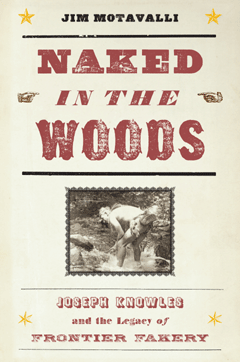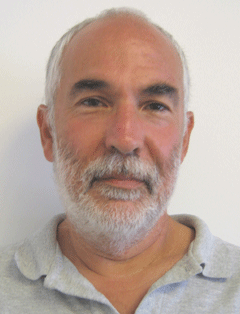Naked in the Woods
Air Date: Week of February 8, 2008

"Naked in the Woods: Joseph Knowles and the Legacy of Frontier Fakery" (Photo: Da Capo Press)
Author Jim Motavalli takes us back 100 years to talk about the life and times of a man intent on proving he could survive naked in nature. Motavalli chats with host Bruce Gellerman about his new book "Naked in the Woods: Joseph Knowles and the Legacy of Frontier Fakery."
Transcript
GELLERMAN: One of the more bizarre chapters in American history began on August fourth, 1913, when Joseph Knowles, stripped to the buff, and, unarmed and alone, trekked off into the woods of Maine’s Dead River Country.
Two months later he showed up in Canada, dressed in bark sandals, deerhide, and a bearskin, happy and well-fed, demonstrating that modern man could thrive, and survive, in the wilderness.
Knowles’ exploits made him a national celebrity. The story of Joseph Knowles and this strange period in the American experience is chronicled by Jim Motavalli in his new book, “Naked in the Woods: Joseph Knowles and the legacy of Frontier Fakery.”
Jim Motavalli joins me from Connecticut where he lives. Mr. Motavalli – thank you very much!
MOTAVALLI: Great to be on.
GELLERMAN: This guy, Joseph Knowles, was quite a character.
MOTAVALLI: He was indeed a character and he definitely comes across as one of the more colorful figures from that era. You know, history can tend to be sort of gray but he was definitely in Technicolor.
GELLERMAN: Well, let’s go to the story. He is commissioned by the newspaper the Boston Post to go off and survive in the wilds of Maine.

Jim Motavalli (Courtesy of Jim Motavalli)
GELLERMAN: Well, they take Knowles up on his offer and he treks off into the north woods of Maine and survives!
MOTAVALLI: He does indeed survive. He kills a bear. That was probably the highlight of his adventures in the woods. He killed a bear and some deer. He made things out of deer hide and he wore the bearskin. And he made simple tools and he emerged really smelling like a rose and it’s not surprising that something like 100,000 people were there in the streets of Boston when he arrived by train and it was really a media frenzy for something like a week.
GELLERMAN: He taps into this zeitgeist, this longing for an American nostalgic period when primitive man survived in the wild.
MOTAVALLI: Yes, there was definitely a connection with frontier figures like Daniel Boon and Davy Crockett and Kit Carson. And certainly the sight of him in a bearskin with his primitive tools that he made in the woods—it was extremely iconic. And in many ways this was the first reality show—they didn’t have television but they did have daily newspapers and they were able to chronicle his adventures everyday with messages he wrote in birch bark that he left to be picked up. And he was even able to illustrate them with charcoal sketches that he did. So this really got the reading public very keyed up.
GELLERMAN: Yeah, he basically reports that he’s living in the lap of primitive luxury.
MOTAVALLI: Yes, he was very boastful of his ability not only to survive in the woods but to thrive. And he would talk about how he was living better than any king and he had three-course meals. This was all very ironic when he was charged with being a fraud. The rival newspaper—the Boston American—which was a Hearst publication, said that he’d actually been faking it and had been living in comfort in a cabin and was being supplied with food and even female company. But the Hearst papers were very aware that Knowles had doubled the circulation of the Post. So after that fury died down they then hired him again. And he did two more expeditions under the Hearst banner. So if they thought he was a fraud it obviously didn’t bother them that much.

"Naked in the Woods: Joseph Knowles and the Legacy of Frontier Fakery" (Photo: Da Capo Press)
MOTAVALLI: Right. You have to see this in context, ‘cause Teddy Roosevelt had recently been the president and he sort of spear headed this idea that the American boy had gotten very soft. And that was the reason for the Boy Scouts and Knowles very much supported the Boy Scouts and talked a lot about this idea of the American boy becoming a sissy and molly-coddled and all that kind of stuff. And the book that he wrote, which is called “Alone in the Wilderness” very much addresses these issues and says that the wilderness is a cure for the modern ailment of too much civilization.
GELLERMAN: So, you’re suggesting that there’s this modern American anxiety and this attempt to reclaim a lost American identity.
MOTAVALLI: Yes, I think that was very much why Knowles was such a success. You would think in looking at it that in 1913, that a lot of people would have basic wilderness skills. For instance, they’d be able to rub two sticks together and make fire. But Knowles actually went on the Vaudeville circuit and the rubbing sticks together and making fire on stage was the highlight of the whole thing. And evidently people had lost that skill and they were very impressed by it and all the other things that he said he could do, such as eating wild plants and setting traps for animals and fishing with sticks. They were enthralled.
GELLERMAN: A lot of people that are spawned by Joseph Knowles wind up kind of doing bizarre things. Sort of outdoing Knowles.
MOTAVALLI: Right. He had many imitators—people who went naked into the woods to try to prove that they could do it, too. And in almost every instance it fell through for one reason or another. Often, really dramatically. In some cases they were attacked by bugs, in some cases it snowed. In some cases they were arrested. But, you know, success spawns flattery and there were definitely a whole lot of Knowles imitators out there—for the next something like 20 years after that.
GELLERMAN: The one that really caught my eye is this guy from Brooklyn—Eden Abez—have I pronounced it correctly?
MOTAVALLI: Yes. Eden Abez was what was called a ‘nature boy,’ and these were Hollywood-based—they actually camped right under the Hollywood sign—and essentially they celebrated eating vegetarian, going naked wherever possible, hiking in the woods. And they had a fair amount of success in Los Angeles and Eden Abez wrote the song “Nature Boy,” which was recorded by Nat King Cole. And they were fairly well known. Of course, they were seen as eccentric and they started some of the first vegetarian restaurants in Los Angeles. Whether there’s a direct connection between Knowles and these people is probably doubtful. I don’t think he would have really enjoyed their message all that much but his message was pretty simple—you can get back to your basic nature if you go into the woods. You can find out what you’re made of. You can recapture the essential humanity of yourself. And he espoused this to the end of his days.
GELLERMAN: Well, Jim Motavalli. Thank you very much.
MOTAVALLI: Thank you.
GELLERMAN: Jim Motavalli is editor of “E/The Environmental Magazine” and author of the new book “Naked in the Woods: Joseph Knowles and the Legacy of Frontier Fakery.”
Links
"Naked in the Woods: Joseph Knowles and the Legacy of Frontier Fakery" by Jim Motavalli
Living on Earth wants to hear from you!
Living on Earth
62 Calef Highway, Suite 212
Lee, NH 03861
Telephone: 617-287-4121
E-mail: comments@loe.org
Newsletter [Click here]
Donate to Living on Earth!
Living on Earth is an independent media program and relies entirely on contributions from listeners and institutions supporting public service. Please donate now to preserve an independent environmental voice.
NewsletterLiving on Earth offers a weekly delivery of the show's rundown to your mailbox. Sign up for our newsletter today!
 Sailors For The Sea: Be the change you want to sea.
Sailors For The Sea: Be the change you want to sea.
 The Grantham Foundation for the Protection of the Environment: Committed to protecting and improving the health of the global environment.
The Grantham Foundation for the Protection of the Environment: Committed to protecting and improving the health of the global environment.
 Contribute to Living on Earth and receive, as our gift to you, an archival print of one of Mark Seth Lender's extraordinary wildlife photographs. Follow the link to see Mark's current collection of photographs.
Contribute to Living on Earth and receive, as our gift to you, an archival print of one of Mark Seth Lender's extraordinary wildlife photographs. Follow the link to see Mark's current collection of photographs.
 Buy a signed copy of Mark Seth Lender's book Smeagull the Seagull & support Living on Earth
Buy a signed copy of Mark Seth Lender's book Smeagull the Seagull & support Living on Earth

